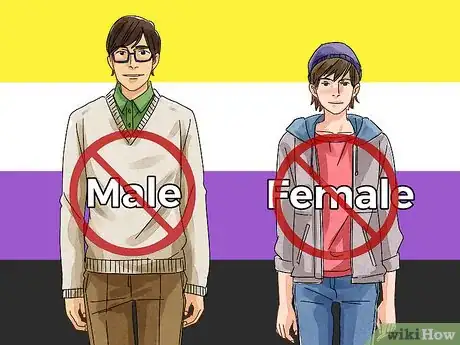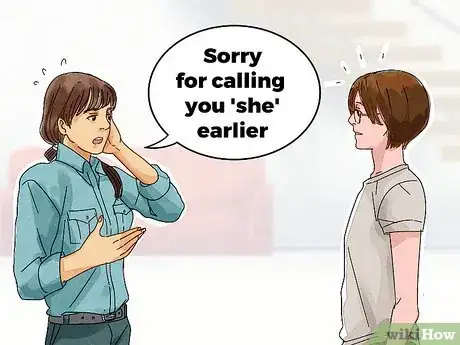X
wikiHow is a “wiki,” similar to Wikipedia, which means that many of our articles are co-written by multiple authors. To create this article, 19 people, some anonymous, worked to edit and improve it over time.
This article has been viewed 154,181 times.
Learn more...
When someone comes out as non-binary, you might be unsure how to refer to them. It's best to go with the individual's preference. However, if you're not sure what to do, being aware of their feelings and needs is a great place to start.
Steps
Community Q&A
-
QuestionI'm a P.E. teacher and I have a non-binary student. I separate the boys and girls, so what do I address them as?
 Community AnswerAsk them what their preferred pronouns are, or just call them by their names. If you're unsure whether they want compete/play with the girls or boys teams, again, just ask them what would make them most comfortable. (You should take them aside quickly before or after class, do not ask them in front of everyone.)
Community AnswerAsk them what their preferred pronouns are, or just call them by their names. If you're unsure whether they want compete/play with the girls or boys teams, again, just ask them what would make them most comfortable. (You should take them aside quickly before or after class, do not ask them in front of everyone.) -
QuestionOne of my friends is Non-Binary, I am struggling to remember this and I find it difficult to call them their preferred pronouns. Is there any way to make it easier to remember?
 Community AnswerYou just have to practice. Correct yourself when you slip up. It will get easier with time and practice.
Community AnswerYou just have to practice. Correct yourself when you slip up. It will get easier with time and practice. -
QuestionIf I were dating someone who was nonbinary, what would I call them, since boyfriend/girlfriend wouldn't be appropriate?
 Community AnswerYou can call them your "partner" or "significant other," or you can ask them what they'd prefer to be called.
Community AnswerYou can call them your "partner" or "significant other," or you can ask them what they'd prefer to be called.
Advertisement
Warnings
- It may be difficult to adjust at first, so don't worry if things are a little rocky. It doesn't make you transphobic or unsupportive; it's completely normal. As long as you try your best to address them properly, you're doing the right thing.⧼thumbs_response⧽
Advertisement
About This Article
Advertisement































































